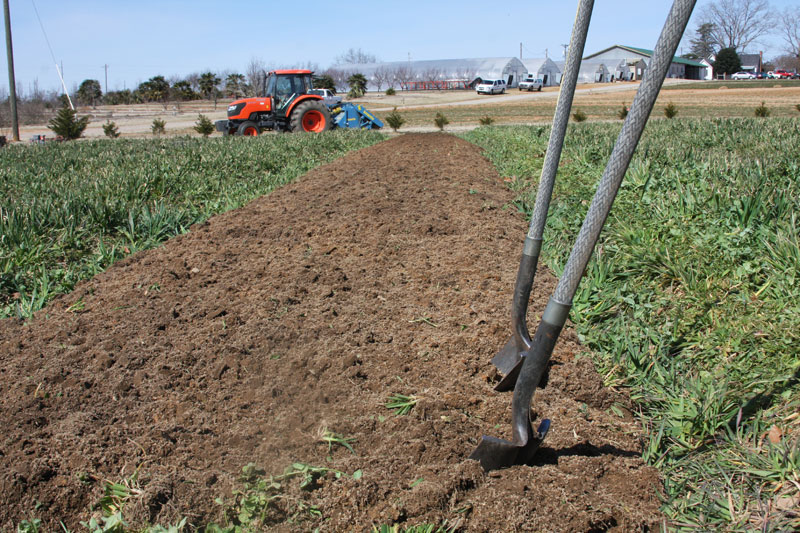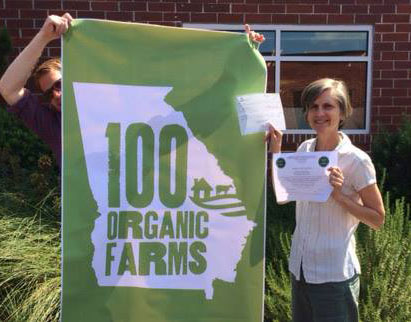Southeastern states lag behind the rest of the country in organic food production, but the reason is not what you think.

In 2004 when Rolls took over as director, there were just 25 certified organic farms in the state; over the next decade, as she watched organic production explode across the country, her chart crept up ever so slowly to show 70 organic farms in the state by 2014, representing less than 4,000 acres total. By comparison, New York and Wisconsin, two states roughly the same size as Georgia, had approximately 900 and 1200 certified organic farms (representing more than 200,000 total acres in each state), respectively.
It’s not that Georgia isn’t a major agricultural state. It ranks 12th in the country in terms of total agricultural receipts (Wisconsin is 9th and New York is 28th), and it’s the nation’s top producer of broilers, peanuts, and pecans; the third biggest producer of eggs; and the fifth most-important state overall for fruit and vegetable production. Rolls was starting to wonder what she’d spent a decade fighting for.
“There are more challenges to growing organically in the south,” says Rolls, noting that the prolonged humidity of southern summers spawns fungal diseases and insect invasions on a scale that growers in places with a dry Mediterranean climate – like California – can’t imagine. “But we have a lot of potential,” she adds, “and if we don’t push that system, we’re losing opportunities here.”
Seeking to carve out a bigger slice of the organic pie, Georgia Organics launched the 100 Organic Farms Campaign in late 2014. The USDA had just announced its organic certification cost share program, which provides a reimbursement of up to 75 percent of certification costs, and Georgia Organics offered to cover the other 25 percent, hoping to eliminate one common reason farmers cite for not pursuing organic certification. The other reason is the bureaucracy associated with achieving and maintaining certification. To help mitigate this obstacle, Georgia Organics offered a half dozen workshops in 2015 to teach prospective organic farmers the ropes of the business and even offered free marketing consultations as well.
“We teach our farmers that going through the process of getting certified is actually a good business practice,” says Rolls. “All those elements like record-keeping – those are all elements of running a good business.”
In addition to these practical matters, Rolls says there are deeper cultural reasons keeping Georgia farmers from jumping on the organic bandwagon – and they aren’t what you might think. Far from being a monoculture of old-fashioned, backwoods conservatism, as the Deep South is often portrayed, Georgia is streaked with enclaves of young, entrepreneurial foodie-farmer types. The Georgia Organics annual conference attracts more than 1,000 attendees each year, and the state counts 141 farmers markets within its borders, on par with liberal bastions like Oregon or Washington, which have 137 and 145 farmers markets, respectively.
The state counts 141 farmers markets within its borders, on par with liberal bastions like Oregon or Washington, which have 137 and 145 farmers markets, respectively.
Rolls says the biggest reason for having so few organic farms in the state is that many in Georgia’s cadre of environmentally-oriented farmers choose not to get certified. Compared to the West Coast and New England, the southeast came late to the organic farming scene – so late that apathy about organics having sold out to corporate interests was already the dominant storyline. Southern farmers, say Rolls, came to equate organic certification with the large-scale farms that catered to national grocery chains, rather than small, artisanal producers selling at farmers markets, to local chefs, and through CSA programs.
“Once the NOP [National Organic Program] started taking off and you had bigger farms and bigger volume happening, the smaller farms began to shift away from the organic standard,” says Rolls. As evidence, she notes that Georgia actually has the most Certified Naturally Grown farms in the country – more than 130, compared to just 18 in California and 39 in New York. This alternative label is based on the same standards as the USDA organic program, but farmers certify each other free of charge, vastly simplifying the process compared to the federal government’s third-party verification system.
The fact that Georgia doesn’t lack farmers who employ organic methods, so much as USDA certified farms, is not particularly comforting to Rolls. CNG farms tend to be very small – one to five acres is typical – which doesn’t “move the needle,” she says. “We have to think about scale. If a 1,000-acre farm converts to organic, think of the impact that farm has versus 25 acres. This is not a slap to CNG. I like CNG … [but] I think it’s a stepping stone.”

Alice Rolls displaying her Georgia Organic’s first farm certification.
Rather than a sign of selling out, Rolls sees scaling up as the only way that organic agriculture can tip the scales of the global food system away from its reliance on chemical inputs. It’s understandable that a one-acre market gardener selling directly to local patrons wouldn’t want to bother with hassle of organic certification, but for a 100- or 200-acre farm that may have a couple dozen employees on payroll and annual sales approaching seven figures, maintaining organic certification is probably low on their list of headaches. When Rolls takes the podium at conferences and workshops around the state she’s doing more than preaching to the choir – she wants to motivate the organic farming crowd in Georgia to think bigger.
“We all have to step out of our little micro-worlds we live in sometimes,” she says. “While there has been awesome progress, agriculture in America is still dominated by the chemical industrial complex … particularly in a state like Georgia where less than 0.1 percent of agriculture is certified organic.”
Sales of organic produce at Whole Foods’ 10 Georgia locations increased over 215 percent in the past 5 years – but much of it is flown in from California.
Business is booming at Whole Foods Markets in the state – sales of organic produce at Whole Foods’ 10 Georgia locations increased over 215 percent in the past 5 years – but much of it is flown in from California. Encouraging more and larger organic producers is only the first step to filling that demand, says Rolls. Greater sales volume will drive infrastructure improvements – the organic suppliers, processors, distribution networks, “food hubs,” and the like – that are needed to bring organic products to the masses.
For example, says Rolls, the nearest source for certified organic seed (which is required for organic certification) is in Virginia. The first organic feed mill in Georgia will soon open, but what Rolls refers to as the “peanut conundrum” remains: “We have farmers willing to grow organic peanuts, but they’re not growing them because we don’t have any certified organic processors,” she says. “It’s not that the processors won’t do it, but they need to have a certain volume to legitimize them getting certified organic. We have to reach those critical thresholds to make those changes happen.”
Her message seems to be getting through. By the end of 2015, the Georgia Department of Agriculture had received 20 applications for the organic certification cost share program. After adding just 45 new organic farms over the previous decade, this was big news. Rolls says a crucial reason for scaling up is the political clout that results: “To have our commissioner of agriculture up there saying, ‘we’re behind this 100 organics campaign,’ is huge in a state like Georgia. If the political leaders don’t see any growth why would they care about it?” One hundred organic farms is still a drop in the bucket of the 14,000-plus organic farms in the country, but Rolls hopes to keep the momentum going with a goal of adding 100 more by the end of this year.
this is great